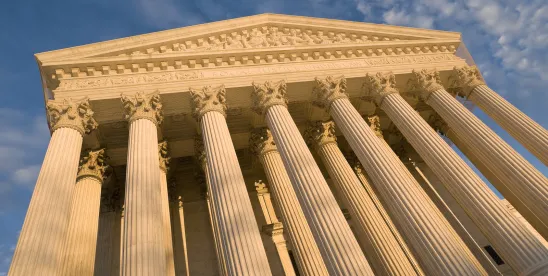On May 30, 2025, the Supreme Court of the United States issued an order granting the Trump administration’s application to stay a lower court order temporarily halting the rescission of the Cuba, Haiti, Nicaragua, and Venezuela (CHNV) parole program. This order allows the administration to resume implementation of this rescission while court challenges continue through the appeals process.
Quick Hits
- On May 30, 2025, the Supreme Court granted the Trump administration’s request to stay a lower court order that had temporarily halted the rescission of the Cuba, Haiti, Nicaragua, and Venezuela (CHNV) parole program, allowing the administration to resume its implementation.
- The Supreme Court’s decision reinstates DHS’s initial notice, potentially invalidating employment authorization documents (EADs) under the CHNV parole program, regardless of their listed expiration dates.
- Employers may need to identify and reverify the employment authorization of impacted employees due to the revocation of the CHNV parole program.
Background
Section 212(d)(5)(A) of the Immigration and Nationality Act authorizes the secretary of homeland security, at the secretary’s discretion, to “parole into the United States temporarily under such conditions as he [or she] may prescribe only on a case-by-case basis for urgent humanitarian reasons or significant public benefit any alien applying for admission to the United States.” Parole allows noncitizens who may otherwise be inadmissible to enter the United States for a temporary period and for a specific purpose.
The Biden administration implemented a temporary parole program for Venezuelans in October 2022, and later expanded the parole program to include Cubans, Haitians, and Nicaraguan nationals in January 2023. Individuals within this program may apply for an Employment Authorization Document (EAD) in the (c)(11) category. The Biden administration announced in October 2024 that it would not extend legal status for individuals who were permitted to enter the United States under the CHNV parole program but encouraged CHNV beneficiaries to seek alternative immigration options.
On March 20, 2025, the U.S. Department of Homeland Security (DHS) published a Federal Register notice announcing the immediate termination of the CHNV parole program. The termination was set to take effect within thirty days of the date of publication of the notice, or April 24, 2025. On April 14, 2025, U.S. District Court Judge Indira Talwani issued a nationwide order staying or temporarily suspending the implementation of this categorical termination of the CHNV parole program. On May 5, 2025, the First Circuit Court of Appeals denied the Trump administration’s request for a stay of Judge Talwani’s ruling. The administration promptly appealed to the Supreme Court.
Analysis and Impact
The Supreme Court’s order reverses the lower court’s temporary pause on the rescission of CHNV parole but does not address the rescission’s merits. Nevertheless, DHS may now proceed with its revocation of CHNV parole as litigation on the merits continues.
The Court’s decision effectively reinstates DHS’s initial Federal Register notice, which in part states that any employment authorization derived through the CHNV parole program was scheduled to terminate on April 24, 2025. Persons with employment authorization documents (EADs) in the (c)(11) category under the CHNV program may no longer have valid work authorization, regardless of the expiration date listed on the EAD itself.
We expect DHS to provide further clarity as to how it intends to proceed with implementing revocation of CHNV parole and how employers should proceed, but based on DHS’s guidance prior to the district court’s initial hold, employers may be required to identify impacted employees and reverify employment authorization.
Identifying which employees are impacted by this change can be challenging, since the public interest parolee EAD category code (c)(11) is typically not entered in the I-9 form or other personnel records.





 />i
/>i
